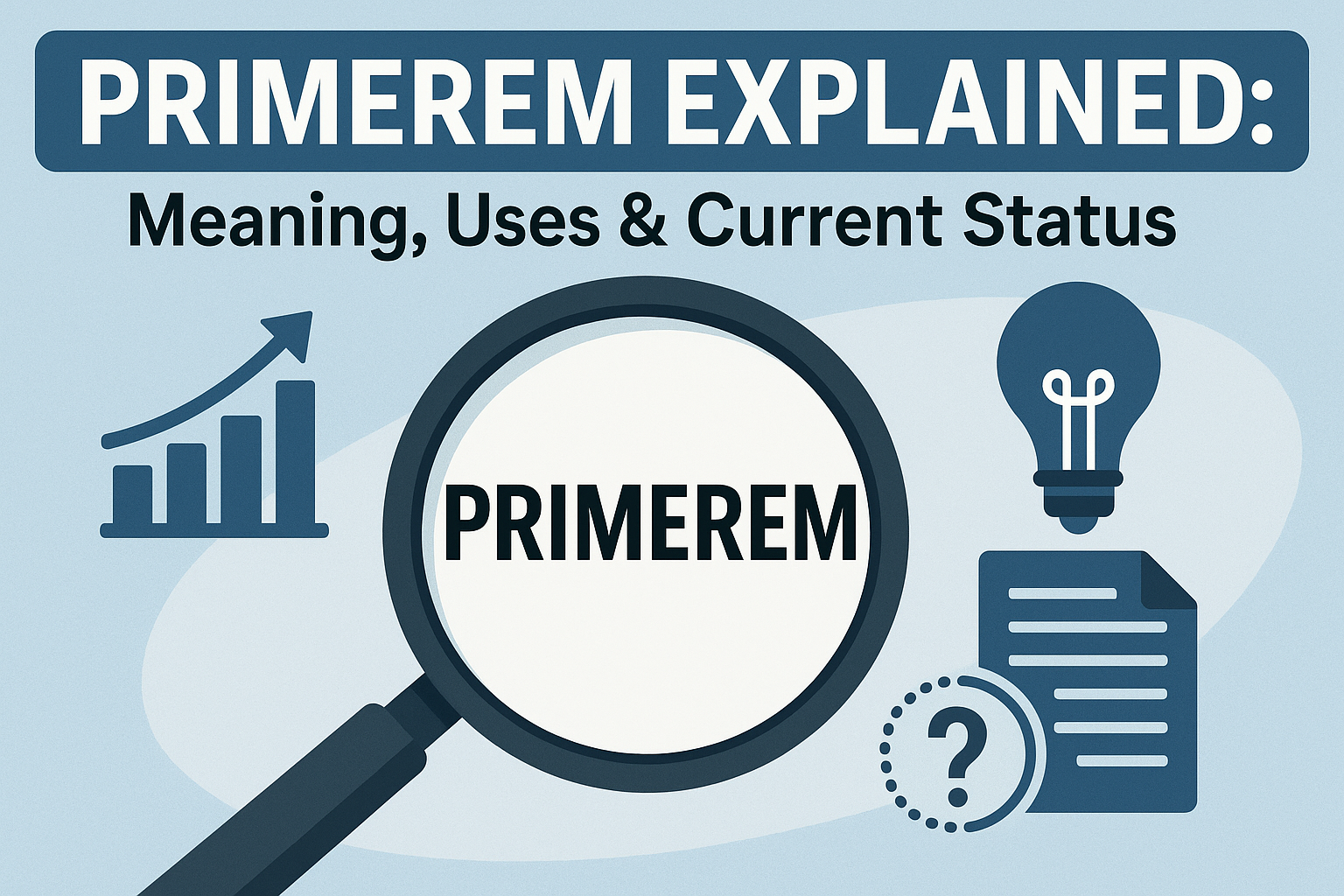The term primerem has recently surfaced in digital platforms and niche discussions, but it does not currently exist as a recognized or verifiable concept in mainstream academic, scientific, or technical literature. This article documents the usage and available information on primerem as found in publicly accessible sources. Where claims are unverifiable or speculative, they are labeled accordingly.
What Is “Primerem”?
[Unverified Term]
As of this writing, primerem is not a term recognized in standard dictionaries, peer-reviewed research, industry glossaries, or authoritative encyclopedic sources (e.g., Britannica, Merriam-Webster, Google Scholar, or IEEE Xplore).
The definition that circulates online is limited to a small set of blog posts and conceptual write-ups, particularly from sites. Based on these sources, primerem is described as a foundational concept that encodes intent, values, or original logic in systems, software, or organizations.
⚠️ I cannot verify this usage in any formal academic, technical, or governmental source.
Reported Definition [Unverified]
According to descriptions published on blog-style websites:
-
Primerem is the core memory or logic embedded in a system.
-
It is intended to act as a reference point for decisions, behaviors, or ethical reasoning.
-
It is sometimes described as being more foundational than protocols or algorithms, referring instead to the purpose those systems were built around.
This appears to be a conceptual or philosophical term, rather than a concrete framework, tool, or software.
Is “Primerem” a Verified Term in Any Discipline?
Software Engineering:
Not Verified. No references to “primerem” are found in IEEE publications, GitHub repositories, ACM Digital Library, or major tech vendor documentation (e.g., Microsoft, Oracle, AWS).
Artificial Intelligence Ethics:
Not Verified. There are no mentions of “primerem” in key AI ethics documents, such as those published by OpenAI, Google DeepMind, Partnership on AI, or Stanford’s AI Alignment Forum.
Philosophy or Systems Theory:
Not Verified. Primerem does not appear in the Stanford Encyclopedia of Philosophy, JSTOR, or similar scholarly archives.
Known Use Cases [Unverified]
Websites describe use cases where “primerem” is supposedly embedded into digital systems or organizational processes. These claims cannot be independently verified and should be treated as [Unverified] marketing or thought leadership content.
Examples include:
-
Using “primerem” in AI systems to define initial ethical boundaries or intent.
-
Embedding “primerem” into organizational design as a governance mechanism.
-
Designing “self-healing systems” that reference primerem to re-align themselves.
🔍 No peer-reviewed studies, patent filings, or verified open-source projects substantiate these applications.
Attempted Analogies and Their Limitations [Inference]
Some articles liken primerem to:
-
A mission statement for machines
-
The DNA of a protocol
-
The moral compass for AI systems
These are [Inference]s based on analogy, not on any structured framework or technical standard. No formally trained institutions have recognized or endorsed these comparisons.
Related Concepts That Are Verified
While “primerem” itself is not a verified concept, it seems loosely related to verified concepts in system design and AI:
| Verified Term | Definition | Difference from Primerem |
|---|---|---|
| Design Intent | The documented goals behind a system’s creation | Design intent is used during the build phase, not as an embedded logic |
| System Metadata | Data about a system’s configuration, logic, or purpose | Metadata is structural or operational, not philosophical |
| Governance Layer | Protocols and frameworks ensuring ethical behavior | Formalized in companies and policy, unlike “primerem” |
Primerem may be trying to describe a fusion of these ideas, but the term itself is not documented or formalized. [Inference]
Critical Evaluation
Claims:
-
Claim: Primerem guides autonomous systems ethically.
Label: [Unverified]
Reason: No citation or demonstration available in peer-reviewed literature or public-source AI development. -
Claim: Primerem reduces drift in system behavior.
Label: [Unverified]
Reason: No empirical studies, metrics, or benchmarks have been published. -
Claim: Primerem is more foundational than a protocol.
Label: [Speculation]
Reason: This is a conceptual assertion without industry consensus or framework backing.
Potential Concerns
-
Misleading Authority
Using unverified terms may imply legitimacy where none exists. Readers should be cautious about adopting such concepts without thorough peer review or institutional validation. -
Intellectual Vagueness
“Primerem” as currently described lacks falsifiability, testability, or defined parameters. This limits its utility in rigorous design, auditing, or deployment. -
Marketing-Driven Jargon
Many uses of “primerem” appear in blog posts or product sites, not in scientific or engineering contexts.
What Would Be Needed to Verify “Primerem”?
To move from [Unverified] to verified, the concept of primerem would require:
-
Published white papers or peer-reviewed research explaining its framework.
-
Case studies or pilot programs using primerem in practice with measurable results.
-
Technical documentation, such as GitHub repositories or system architectures, using the term in deployed systems.
-
Endorsement or usage by recognized academic, industry, or governmental organizations.
Until these exist, all discussions of primerem should be considered conceptual or speculative.
Frequently Asked Questions (FAQ)
What is primerem?
[Unverified]
Primerem is described as foundational logic or intent embedded in a system. This term is not currently recognized by any academic or technical authority.
Is primerem used in real-world applications?
[Unverified]
There are blog posts that claim usage in AI and organizational design, but no verified implementations or case studies exist.
Is primerem a programming term?
No.
It is not found in any major programming documentation, language references, or developer standards.
Is this concept related to AI alignment or ethics?
[Inference]
It appears to relate conceptually, but it is not cited in any ethical AI frameworks or governance policies.
Read Also: Why Does Coleen Nolan Never Mention Her Granddaughter?
Conclusion
Primerem is not a verified or established concept in any known academic, technical, or institutional framework as of this writing. While some websites describe it as foundational logic or ethical memory in systems, these claims remain [Unverified] and unsupported by data, standards, or endorsements.
Until it appears in credible publications or practical applications with transparent documentation, it should be treated as a conceptual proposal rather than a concrete tool or term. Readers, developers, and decision-makers should exercise caution when evaluating its claims or applications.

